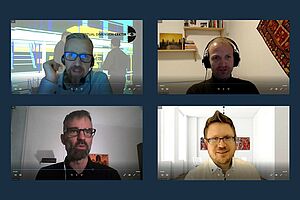The ZukunftsBAR event series brings together scientists and companies to view and discuss new technologies from different angles and to jointly explore economic opportunities. The topic of the 6th ZukunftsBAR, which took place online on November 11th, was the potentials and challenges of virtual reality in medicine.
Virtual Reality (VR) is no longer only found in the world of computer games. It now plays a prominent role in almost all economic sectors. Especially in medicine, VR techniques help to better understand and master complex issues. In view of the shortage of qualified personnel and increasing healthcare costs, virtual reality can also offer economically attractive solutions.
VR experts met at the 6th ZukunftsBAR to discuss the current state of research and economic options of virtual reality in medicine. Dr. André Domin, CEO of the Technology Park, welcomed the participants and explained: "The ZukunftsBAR is also about bringing together researchers and developers with users from industry and business."
Prof. Dr. Christoph Runde (top left), CEO of the Virtual Dimension Center Fellbach and honorary professor at the Heilbronn University of Applied Sciences, gave the participants an overview of the numerous fields of application of virtual reality in medicine. He explained that, compared to other industries, medicine is the most specialized field of application of Virtual Reality. The broad spectrum ranges from diagnostics and the planning of operations and therapies to training and marketing materials.
Dr. Lars Riedemann (top right), a physician trained in neurology and biomedical engineering, highlighted the still unexploited potential of virtual reality in the healthcare sector. "Virtual Reality is currently only used by a few medical providers in Germany, although the added value for patients has been proven for years on the basis of scientific data". Based on some of these data, the U.S. Food and Drug Administration (FDA) has already granted approval for a VR pain therapy, for example, which is now being routinely used in several hospitals in the U.S. As reasons for the hesitant application of VR techniques, Riedemann named problems in translating VR research results into clinical practice, in addition to the low level of awareness of the technology. Furthermore, he pointed out a risk factor in the area of data security. According to an American study, VR users can be identified with a very high probability just by their movement profile, which raises important questions about how to handle this new data.
Boris Kantzow (down left), co-founder and co-managing director of Weltenmacher GmbH, reported on the practical experience of developing medical virtual reality training. He explained that with the help of established frameworks, training programs in the health sector could now be implemented in just a few months. However, especially small users often shy away from the costs of such programs. Weltenmacher GmbH has therefore developed a licensing program that significantly reduces the costs for individual users. Another currently interesting application due to the corona crisis is the development of a training program for medical personnel for artificial respiration.
Dr. Dennis Steininger (down right), administrator of the Chair of Business Administration and Management of Digital Transformation at Clausthal University of Technology, also took part in the discussion following the presentations and contributed his entrepreneurial view of the topic.
